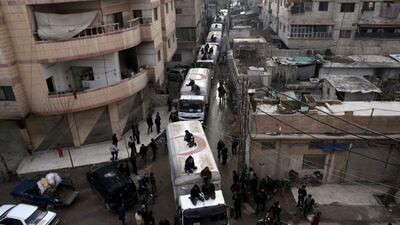BEIRUT // The Syrian government and representatives of the country’s opposition have agreed to an internationally-backed temporary ceasefire – set to come into effect on Saturday – if their conditions are met.
While the breakthrough would represent the first countrywide pause in fighting between the rebels and the regime in nearly five years of war, the same problems that have derailed all recent truce plans so far still remain.
There is no guarantee that the government and its allies will refrain from attacking rebel forces and it seems unlikely that the opposition’s preconditions for a deal will be met.
On Tuesday, the Syrian government said it would take part in the cessation of hostilities as long as ISIL, Al Qaeda’s Syrian affiliate Jabhat Al Nusra and “other terrorist groups associated with Al Qaeda” were excluded from the agreement.
The phrasing of the statement leaves open the possibility that certain rebel factions could still be targeted by the regime of president Bashar Al Assad and its allies.
A number of opposition groups – most notably the powerful, hardline Salafist militias Ahrar Al Sham and Jaish Al Islam – are allies of Al Nusra.
Beyond these rebel groups, the regime and their allies such as Russia often use catch-all phrases like “terrorists” and “Al Qaeda” when hitting a multitude of opposition targets.
“Success prospects of the ceasefire agreed by Russia and the US are very low,” said Lina Khatib, a senior research associate at the Paris-based Arab Reform Initiative.
“Like the cessation of hostilities agreement previously made in Munich, the new agreement once again permits Russia to continue its air campaign in Syria under the pretext of targeting terrorist groups. Unless Russia stops bombing groups belonging to the Syrian opposition through this campaign, rebel groups will not abide by the ceasefire agreement.”
Given the prominent position of rebel allies of Jabhat Al Nusra in the Syrian opposition, targeting them would likely break the truce.
Even if they are not targeted, groups like Ahrar Al Sham and Jaish Al Islam might feel pressure to come to Al Nusra’s aid during a halt in fighting between the rebels and government.
There are also concerns among rebels that the proximity of Al Nusra positions to Free Syrian Army units across the country could give the government a pretext to continue its offensive.
And if pro-government forces refrain from intentionally striking rebels, the proximity of Al Nusra positions to rebels raises the chances of mistakes happening.
Yezid Sayigh, a senior associate with the Carnegie Middle East Centre in Beirut, called the truce agreement a “serious opportunity” but said violations of the ceasefire orders must be closely monitored to ensure the deal was not being exploited.
“Russia and the US will also need to agree on some sort of monitoring mechanism of process for determining who is responsible for any local breaches of a ceasefire,” he said. “This will pose a special problem if Russia and the regime appear to be exploiting alleged violations so as to press on strategic areas such as Aleppo, where the regime may still try to complete its encirclement in the opposition-held parts of the city.”
The High Negotiations Committee – the Saudi-backed group created to represent the Syrian opposition in any talks with the government – gave its preliminary consent to the ceasefire deal on Monday. But their participation in the truce is conditional on the government and its allies halting bombardments, ending sieges, allowing aid deliveries and releasing all detainees.
The government would likely consent to ending bombardments and sieges, and allowing aid if it is indeed serious about wanting a break in the fighting. However, it is far less likely to release the tens of thousands of detainees believed to be in its custody.
While the High Negotiations Committee signalled that it would accept the truce, they are doubtful of its successful implementation.
High Negotiations Committee head Riad Hijab “said he does not expect the Assad regime, Russia and Iran to cease hostilities, due to their realisation that the regime’s survival depends on the continuation of its campaign of oppression, killing and forced displacement”, the group said. “Therefore, the regime and its allies will continue to derail the political process and evade the inevitable.”
What pro-government forces do in the days leading up to the ceasefire on Saturday will likely determine whether the opposition consents to the truce in the end. If the government offensive on rebel-held parts of Aleppo intensify and threaten to cut off the opposition forces from their supply lines, there will be little to convince them that the government is capable of goodwill.
Already on Tuesday, the day after the truce was announced by Russia and the US, air strikes pummeled one of the last roads out of the rebel-held part of Aleppo.
jwood@thenational.ae
* With additional reporting from Reuters

